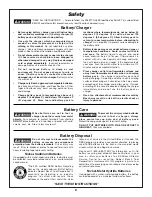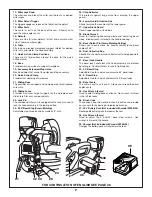
3
Safety
“READ ALL INSTRUCTIONS” — Failure to follow the SAFETY RULES identified by BULLET (•) symbol listed
BELOW and other safety precautions, may result in serious personal injury.
•
Inspect guards before using a tool. Keep guards in
place. Check moving parts for binding or any other
condition that may affect the normal operation or
safety features of the tool. If damaged, have tool
serviced before using the tool.
Many accidents are
caused by poorly maintained tools.
•
Do not alter or misuse tool.
Any alteration or
modification is a misuse and may result in serious
personal injury.
•
The use of any other accessories not specified in this
manual may create a hazard.
Accessories that may be
suitable for one type of tool, may become hazardous
when used on an inappropriate tool.
Service
•
Tool service must be performed only by qualified
repair personnel.
Service or maintenance performed by
unqualified personnel may result in misplacing internal
wires and components which could cause serious
hazard.
•
When servicing a tool, use only identical replacement
parts. Follow instructions in the Maintenance section
of this manual.
Use of unauthorized parts or failure to
follow Maintenance Instructions may create a hazard.
Safety Rules for
Miter Saws
•
Use clamps to support workpiece whenever
possible. If supporting the workpiece by hand, you
must always keep hand outside of “No Hands” area
as marked with a symbol on the base. Do not use
this saw to cut pieces that are too small to be
securely clamped.
Your hand if placed inside the “No
Hands” region can easily slip or be pulled into the blade.
•
Do not reach in back of the saw blade behind the
fence with either hand to hold down or support the
workpiece, remove wood scraps, or for any other
reason.
The proximity of the spinning saw blade to your
hand may not be obvious and you may be seriously
injured.
•
Never cross your hand over intended line of cutting.
Supporting the workpiece “cross handed” i.e. holding
the left side of the workpiece with your right hand is very
dangerous.
•
Disconnect battery pack from tool before
performing any assembly, adjustments, changing
accessories, or storing the tool.
Such preventive
safety measures reduce the risk of starting the tool
accidentally.
•
Miter saws are intended primarily to cut wood or
woodlike products, they cannot be used with
abrasive cutoff wheels for cutting ferrous material
such as bars, rods, studs, etc. However, if cutting
materials like aluminum or other non-ferrous metals,
use only saw blades specifically recommended for
non-ferrous metal cutting.
Cutting ferrous materials
causes excessive sparking and will damage the lower
guard and will overload the motor. (NOTE: Robert Bosch
Tool Corporation does not offer 10” metal cutting
blades.)
•
Inspect your workpiece before cutting. If workpiece
is bowed or warped, clamp it with the outside bowed
face toward the fence. Always make certain that
there is no gap between the workpiece, fence and
table along the line of the cut.
Bent or warped
workpieces can twist or rock and may cause binding on
the spinning saw blade while cutting. Also, make sure
there are no nails or foreign objects in the workpiece.
•
Do not use the saw until the table is clear of all tools,
wood scraps, etc., except the workpiece.
Small
debris or loose pieces of wood or other objects that
contact the revolving blade can be thrown with high
speed at the operator.
•
Do not feed workpiece into the blade or cut
“freehand” in any way. Workpiece must be
stationary and clamped or braced by your hand.
Saw
must be fed through the workpiece smoothly and at a
rate which will not overload the saw’s motor.
•
Cut only one workpiece at a time.
Multiple workpieces
cannot be adequately clamped or braced and may bind
on the blade or shift during cutting.
•
Be certain the miter saw is mounted or placed on a
level, firm work surface before using.
A level and firm
work surface reduces the risk of the miter saw becoming
unstable.
•
Plan your work. Provide adequate support
accessories such as tables, saw horses, table
extension, etc. for workpieces wider or longer than
the table top (see page 50).
Workpieces longer or
wider than the miter saw table can tip if not securely
supported. If the cutoff piece or workpiece tips it can lift
the lower guard or be thrown by the spinning blade.
•
Do not use another person as a substitute for a table
extension or as additional support.
Unstable support
for the workpiece can cause the blade to bind or the
workpiece to shift during the cutting operation pulling
you and the helper into the spinning blade.
•
The cutoff piece must not be jammed against or
pressured by any other means against the spinning
saw blade.
If confined, i.e. using length stops, it could
get wedged against the blade and thrown violently.
“SAVE THESE INSTRUCTIONS”
WARNING
!
Содержание 3924-24
Страница 86: ...86 Notes Remarques ...
Страница 87: ...87 Notas ...




































